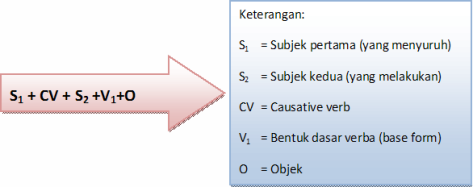Causative verbs adalah verba-verba yang digunakan pada kalimat yang berfungsi untuk membuat orang lain melakukan sesuatu. Secara umum kalimat causative memiliki pola sebagai berikut:


Belajar Komputer Perkantoran, Desain Grafis, Percetakan dan Trik Trik Komputer. cara cepat belajar komputer
Go to Blogger edit html and find these sentences.Now replace these sentences with your own descriptions.
Go to Blogger edit html and find these sentences.Now replace these sentences with your own descriptions.
Go to Blogger edit html and find these sentences.Now replace these sentences with your own descriptions.
Go to Blogger edit html and find these sentences.Now replace these sentences with your own descriptions.
Go to Blogger edit html and find these sentences.Now replace these sentences with your own descriptions.


| Past Tense | Present Tense | Invinitive | |
| Was, were Had Did Could Might Had to Needed Would Should Ought to Dared Used to | Am, is , are Have, has Do, does Can May Must Need Will Shall Ought to Dare ********** | To be To have To do To be able to To be allowed to To have to To need To be going to To be going to *********** To dare *********** |
| Infinitive | Past Tense | Past Participle |
| abide | abode, abided | abode, abided |
| arise | arose | arisen |
| awake | awoke | awoken |
| be | was | been |
| bear | bore | borne, born |
| beat | beat | beaten |
| become | became | become |
| befall | befell | befallen |
Subject | Object | P. Adjective | P. Pronoun |
I | Me | My | Mine |
You | You | Your | Yours |
We | Us | Our | Ours |
They | Them | Their | Theirs |
He | She | Her | Hers |
She | Him | His | His |
It | It | Its | Its |